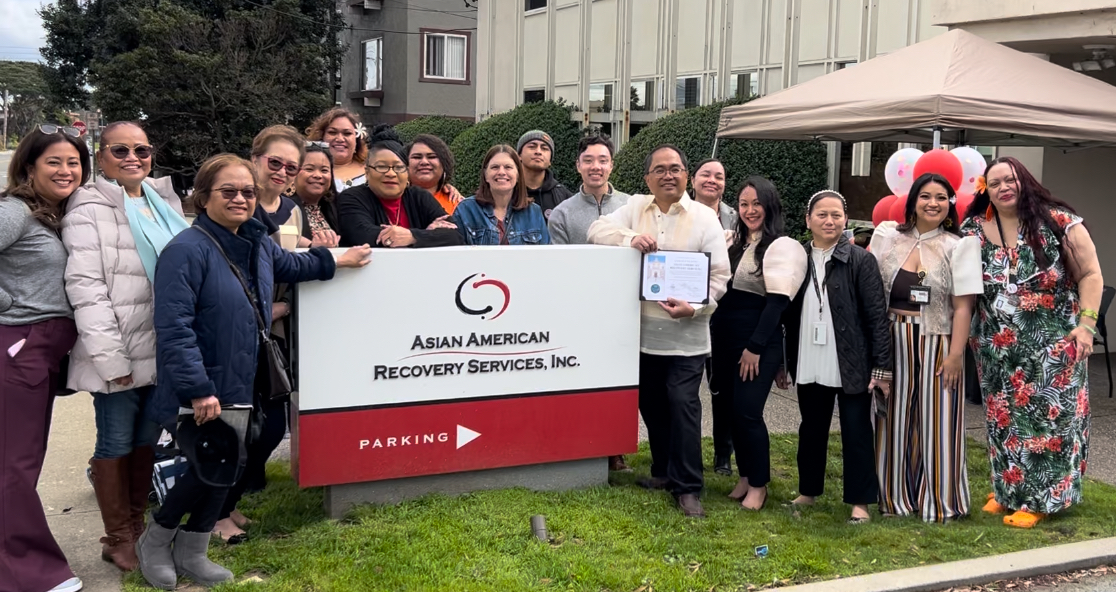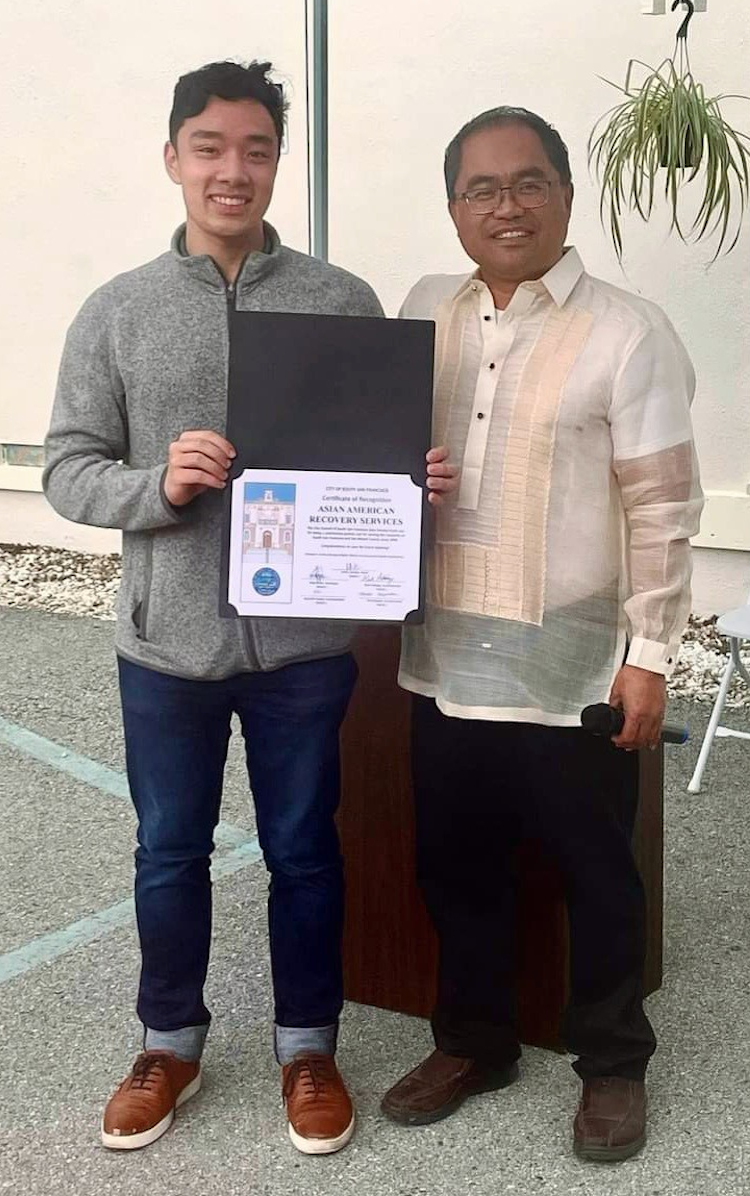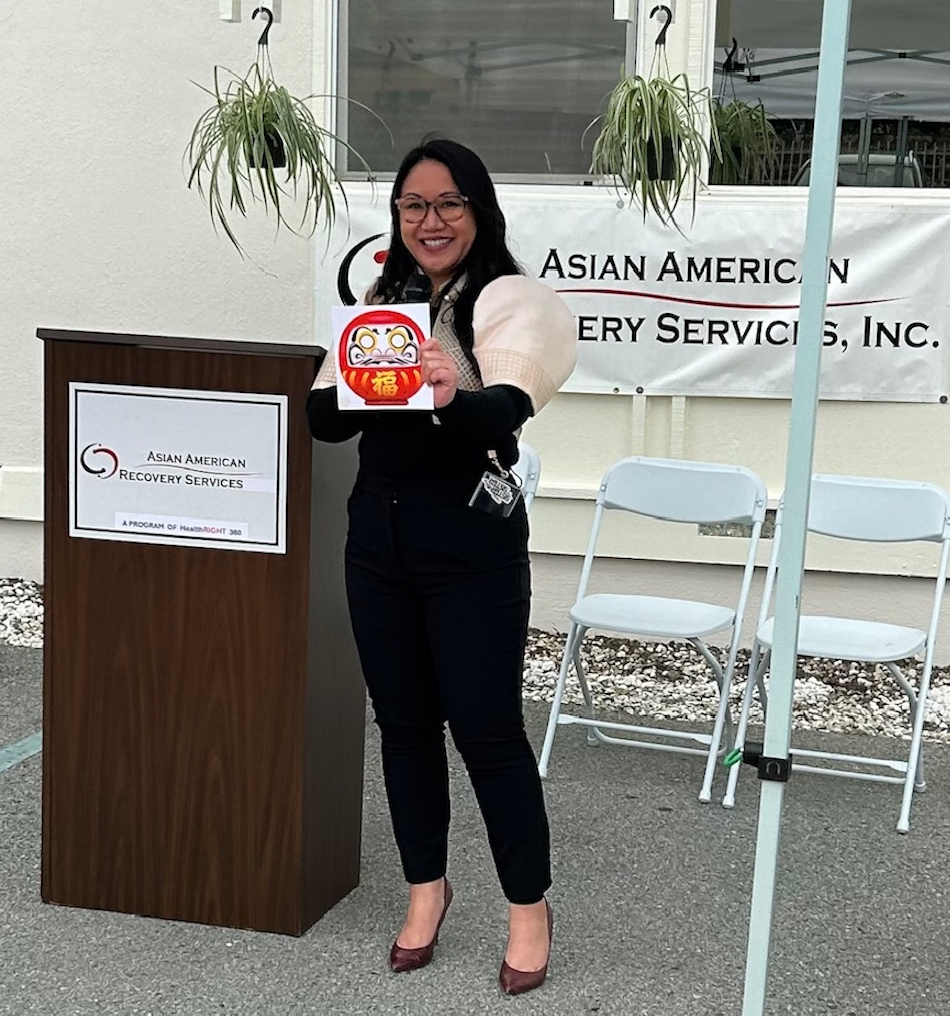Fil-Ams lead program to deter substance use among AAPIs

County and City officials led by South San Francisco Mayor Coleman and Colma Council member Joanne del Rosario, area clinicians and resource providers, former clients, former and current staff celebrate the consolidated programs at AARS/Healthright360 in South San Francisco. Photo by Cherie M. Querol Moreno
SOUTH SAN FRANCISCO – This city, where nearly half of residents trace their heritage to the world’s largest continent, formally reopened the country’s pioneering organization dedicated to deterring substance use among Asian Americans and Pacific Islanders.
Music emanated from the balloon-festooned two-story building on 1115 Mission Road here on March 22 as San Francisco Bay Area service providers arrived to celebrate the consolidation of the San Mateo County programs of Asian American Recovery Services and the return of its in-person assistance.
Garbed in their traditional barong Tagalog, innovative terno and vibrant Samoan puletasi, the nonprofit agency management and staff welcomed partners, former co-workers and clients, and county and city officials who praised the team’s groundbreaking work to “reduce the impact of substance use” in the focus population through culturally competent pathways.

South San Francisco Mayor James Coleman (left) presents AARS-Healthright360 San Mateo County Program Manager Junior Flores commendation on the grand reopening of the nonprofit organization. Photo by Cherie M. Querol Moreno
That means planning, implementing and evaluating programs with the ability to understand and respect the diverse belief and value systems across cultures.
“Coming here is like coming home, everyone’s always welcoming,” said guest speaker Allen Bustos, a Filipino American on track to earn his master’s degree after having overcome the habit with empathetic intervention at the agency.
Now simply called and instantly recognized by its acronym, AARS was established in 1985 in San Francisco by community advocates to address the rising rate of substance use in their community.
In 2013, AARS merged with Healthright360, provider of integrated care including primary medical, mental health, substance use disorder treatment and re-entry services in 11 counties.
Loyal to its cultural competence philosophy, its programs in San Mateo County – home of Daly City, Colma, South San Francisco, San Bruno and San Mateo – where Fil-Ams comprise the most AAPI populations, are overseen by Junior Flores, who was born in the Philippines.
Growing with the program
When Anastacio Flores Jr.’s parents brought him and his three older siblings to San Francisco in 1981, the 9-year-old quickly realized that life would not be the same as what they left behind in Lamo, Nueva Vizcaya.
“Junior” was the only Filipino in his 3rd grade class, and his first friend was Korean. He spoke only Ilocano and his classmate only Kugo, but somehow they managed to get along, found ways to communicate and together learned English, as well as how to outsmart each other at playing tag.
That openness, confidence and resilience sprang from the nurturance he enjoyed from childhood onward.
“I was blessed growing up (because) aside from my parents and older siblings, I had teachers, coaches and counselors that encouraged and guided me. I assumed everyone had that,” Flores told Inquirer.net USA. “I realized pretty quickly that wasn’t the case.”
He chose to study psychology at San Francisco State to delve into behavioral health with the intent of helping those who did not have the tools to face adversity or had lost their way. Unlike himself.
“Always been in the straight and narrow,” he looked back, frankly grateful but not judgmental.

The Daruma Doll symbolizes perserverance, a cultural values guiding AARS work, says Healthright360 Divisional Director Razelle Buenavista. Photo by Cherie M. Querol Moreno
He was hired by AARS to work with Filipino youth in Daly City’s Jefferson Union High School District (JUHSD) of whom many were on probation, he said. His hire date was Sept. 10, 2001. The day after shook the world with the first terrorist attack on American soil, sending him to emergency mode, and testing his mettle.
“I learned that day how to treat your staff and that is with compassion. (Then-JUHSD Trustee) Dave Mineta provided the space and support for everyone to process the horrific events of that day,” he recalled, noting that out of the crisis grew trust and friendship he found with one of the agency’s earliest officers, whom he considers his role model.
Flores worked with the youth sector for five years before moving on to Outpatient Drug & Alcohol Services for Adults (ODASA). There he rose to supervisor to manager then director until the merger.
Bouncing back
Last year his team was relocated from its offices for 22 years on busy Mission Street in Daly City, accessible to walk-ins, to the Mission Road building further south that had housed the AARS administration from 2007 to 2013.
“There were a lot of transitions and it was an opportunity for me with the staff that stayed. We wanted to maintain the spirit of AARS and that is culturally-responsive services,” he said. “We have been able to keep our autonomy in developing programs and selecting funding opportunities.”
San Mateo programs include:
- Separate women and men’s residential facilities to help support adults in life free from addiction;
- Sister-to-Sister Leadership Conference for girls engaging in at-risk behaviors to hear from contemporaries who have experienced and overcome the same;
- PIONEERS (Pacific Islanders Organizing & Nurturing Everyone to Rise & Serve) providing mental health services, substance use disorder and treatment and outpatient services;
- Essence of MANA, an outreach and prevention program for the Samoans and Tongans in North San Mateo County;
- Pioneer Court Outpatient program provides youths and adults caring individual or group counseling and care coordination; and
- ODASA, the outpatient substance use treatment program provided by bilingual and bicultural staff trained in current evidence-based therapeutic approaches and has an understanding of the social and cultural realities of Asian American clients.
More programs can be found here.
Flores counts his top accomplishments as “developing programs and securing funding for Native Hawaiian and Pacific Islander services and in the process developing Native Hawaiian and Pacific Islander leaders who have become the face of AARS at local and national events,” and “maintaining the Filipino focus for ODASA, being able to always hire and retain Filipino clinicians.”
He encourages anyone who needs or knows someone who needs help with substance use to call (650) 243-4850 or ODASA at (415) 377-0140.
With Healthright 360 Divisional Director Razelle Buenavista, Flores forms the Filipino American leadership of AARS/Healthright360.
Buenavista oversees the 14 behavioral health and prevention services in San Mateo and Santa Clara Counties.
The social work alum of San Jose State has garnered some 25 years of experience and expertise in the field of social services. She is candid like Flores in that she attributes her “passion to advocate for the underserved…from” being “mentored and counseled by Filipino counselors from Filipinos for Affirmative Action during challenging times” in her youth.
Buenavista has proclaimed her commitment to “empowering the next generation of social workers and community healers.”
In her remarks at the grand reopening, she presented the Daruma Doll, less a toy than a talisman to the Japanese. Often given as a gift of encouragement. the round figure is modeled after Bodhidharma, founder of Zen Buddhism.
“Its eyes are blank white for the owner to fill out when a goal is achieved,” she explained. “It’s round and hollow, so it always bounces back, it never falls,” she continues, a perfect metaphor for AARS’ mission, modeled by workers whose own stories prove the power of caring and compassionate support.

